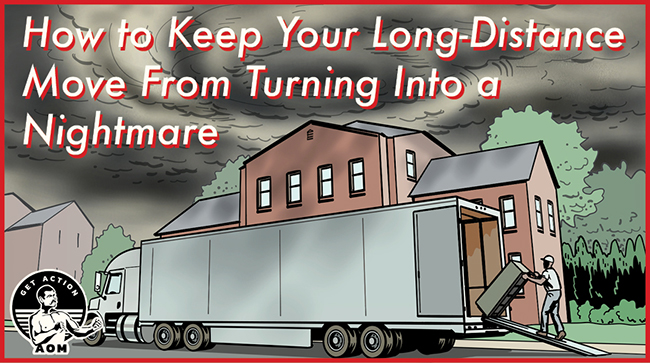
Several months ago, friends of ours hired movers for their family’s cross-country relocation.
They got bids from three companies and chose the cheapest — International Van Lines — both because of the price and because the delivery date best matched their schedule. The company had negative reviews online, but ChatGPT and Forbes recommended it, and the bargain seemed like a risk worth taking.
When the movers arrived, my friend was concerned to see that the name on the truck and boxes was not International Van Lines but that of a different company. And the crew seemed to be packing things up haphazardly — throwing onions from the kitchen counter into boxes along with toothbrushes from the bathroom.
The movers said they’d drive directly from Oklahoma to the family’s new home in Idaho and get there in a couple of days.
The family headed out to ID themselves and took up residence in their empty house, awaiting the arrival of their possessions. When a few days went by without hearing from the movers, my friend reached out to ask when they might be expected. She couldn’t reach the person she’d booked with and was passed to a succession of new contacts, who said they’d keep her posted as to an updated delivery date.
A week went by. Then another. The family was sleeping on air mattresses and living with the few possessions they’d brought with them; they had no beds, no furniture, no cookware. When my increasingly frustrated friend would text and call asking for updates, the company wouldn’t respond for long stretches. When they did, they only offered vague assurances that delivery was coming as soon as possible.
Finally, a month after the movers had driven away with their belongings, my friend got word that the shipment was on its way. However, when the truck — much larger than the one loaded in Tulsa — got close, the driver found it couldn’t fit down the street to our friends’ new house. He decided to park the truck in another location, stay the night, and then rent a U-Haul (which the family had to pay for) to ferry the boxes to their house the next day.
The original crew, unwilling to stick around, disappeared, and the driver hastily assembled an impromptu team of sketchy, surly local laborers to unload the truck and finish the job.
After a month of limbo and living out of suitcases, the family finally had their belongings back — although even then, not all of them were intact.
Unfortunately, our friends’ experience isn’t unique. Cross-country moves are fertile ground for scams, stress, and screw-ups.
To understand how to avoid a moving nightmare, I talked with Finn Murphy, a former professional trucker and the author of The Long Haul. Finn’s seen it all, from well-run moves to catastrophic ones. Here are seven mistakes he recommends avoiding to make sure your stuff gets where it’s supposed to, safely and on time.
Mistake #1: Hiring Movers Off the Internet
One of Finn’s fundamental rules is to get off the internet when hiring a mover.
When most people need to move, the first thing they do is Google “Oklahoma City to San Francisco movers.”
Problem is the top result isn’t necessarily a moving company at all. It’s probably a broker: a middleman with no trucks and no crews.
Brokers take your booking, then farm it out to different moving companies. The broker pockets a commission, and you end up with a moving company you’ve never spoken to or vetted. When your stuff is missing, you call the broker, who shrugs: “Talk to the movers.” When you call the movers, they shrug: “Talk to the broker.”
When people’s stuff gets lost or held up for weeks, it’s usually because they hired through a broker. That’s what happened to our friends.
Finn explained what goes on:
Let’s say your shipment is picked up in Oklahoma for delivery to San Francisco. To be efficient and cost effective, the moving company doesn’t want to take just your stuff West; it wants to pick up another load of someone else’s stuff along the way. If that additional load hasn’t materialized yet, your goods get unloaded into a warehouse to wait for one, potentially leaving your stuff sitting there for weeks.
Our friends’ stuff was originally taken not to Idaho, but to a warehouse in Houston, awaiting another westbound delivery to piggyback on. At one point, the company told the family they could expedite a more direct delivery if they paid more money — essentially a shakedown.
A brokered move doesn’t just risk delays. If your things are damaged or lost, liability is murky: the broker claims no responsibility, and the carrier may not even have valid cargo insurance.
The hard part about all this is that it’s difficult to identify when the “moving company” you’ve reached out to is actually a broker. When my friend talked to the agent at International Van Lines initially, she asked him directly if the company acted as a broker, and he said that they did not, that “It’s just us.” He was warm, responsive, and said all the right things, even insisting, “We’re the good guys in the industry.” Lots of other people have had experiences where companies straight-up lied about whether or not they farm the job out.
So what should you do?
Before you sign a contract, consider these things:
- DOT number. Look this up on the FMCSA’s website. It will tell you if they’re a carrier (good) or just a broker (red flag).
- Deposits. Brokers usually ask for a large upfront deposit (sometimes 20–40% of the estimate). Legit carriers generally don’t. They might require a small reservation fee, but most payment happens on delivery.
- Company name. United Van Lines, Allied, Atlas, Mayflower, etc. are legitimate national carriers with fleets. Scammers use sound-alike names (“International Van Lines” vs. “United Van Lines”) or keep changing names to bury bad reviews and dodge accountability. Make sure you’re hiring who you think you’re hiring.
- Reviews and recommendations. Fake positive ratings abound, and sites like Forbes make a commission by using affiliate links, which, despite claims to the contrary, may influence recommendations. ChatGPT, which bases its advice on a trawl of the internet, will just echo those inflated reviews.
Even legit carriers like Mayflower may transfer your load mid-route, leaving it in a warehouse until another truck headed in your direction is available. The difference is that it stays in the same system; you’re dealing with one accountable company, not a disappearing broker-carrier shuffle.
The best tack to take is to deal with a real, reputable company that has trucks. A company with an actual office, a local presence, and staff that picks up the phone. Someone you’ve gotten bona fide word-of-mouth recommendations for. Someone you could hypothetically bump into at church or your kid’s Little League game. If they’re rooted in your community, they’ve got a reputation to protect.
Mistake #2: Choosing Movers Based on the Cheapest Price
A locally-based, reputable mover can cost more than twice as much as the bargain movers. That can be a tough pill to swallow, but it’s one worth getting down the hatch.
Finn pointed out one of the strangest ironies of moving: people will entrust all the things they value most — their furniture, heirlooms, photos, books, tools, clothes — to the cheapest bidder they can find.
“Think about that for a second,” he told me. “It makes absolutely no sense.”
Yes, moving is expensive. But the surest way to turn your move into a financial and emotional disaster is to hire the rock-bottom outfit. Those bargain companies often turn out to be brokers who cut corners, delay delivery, or outright disappear with your goods.
Get multiple quotes, and if one comes in dramatically lower than the others, that’s not a bargain — it’s a red flag.
A higher upfront cost will often save you far more in stress, damage, and potential loss down the line.
Mistake #3: Skipping the In-Home Estimate
There are several ways a moving company will estimate the cost of your move and give you a bid:
- Cubic-foot: If a mover quotes you by cubic footage, walk away. Cubic feet are easy to fudge. If the crew loads sloppily, or simply claims your shipment “took up more space than expected,” your price can double once your stuff is already on the truck.
- Virtual: Some reputable movers now offer estimates via video call. This can work for simple moves, but it’s not foolproof. It’s easy for items to get overlooked, and what gets overlooked gets tacked on as an extra charge later.
- In-home, by weight: This is the way you want to go. The estimator walks through your house, notes every item, and produces a binding estimate based on the shipment’s weight. Weight is objective and regulated; cubic footage is not. If you disclose everything honestly, the driver can’t later claim “surprise” items and reprice the job.
Finn emphasized this point: when customers skip the in-home estimate, they usually end up under-reporting their stuff — whether by accident or wishful thinking. “If you don’t tell the estimator about the 7,000 pounds of weights in your basement, it won’t show up on the estimate,” he said. “When the driver finds them on moving day, the estimate is no longer binding.”
That omission not only costs you more, it also antagonizes the very guy who’s handling your possessions. An honest, in-person walkthrough keeps the pricing fair and the relationship copacetic.
Mistake #4: Not Thoroughly Checking the Contract
The contract you sign with the movers — the “bill of lading” — is what protects you, or leaves you exposed. A lot of people glance at it and sign, and that’s where the trouble starts.
Here’s what to look for:
- Name of company that will be picking up your stuff. If this isn’t listed, you may be dealing with a broker, and your stuff could end up with a company you’ve never heard of.
- DOT number. The DOT number lets you verify the carrier’s licensing and safety record.
- Type of estimate. Make sure it’s binding or binding-not-to-exceed. A non-binding estimate leaves the door open for the price to balloon once your goods are loaded.
- Line-item fees. Fuel surcharges, packing materials, storage, “long carry” upcharges — every potential fee should be spelled out. Vague language like “as applicable” is a red flag.
- Delivery window. The contract should spell out specific pickup and drop-off ranges, not “TBD.” Some contracts give the mover up to 21 business days — which doesn’t include weekends — so in practice they may have closer to 30 days to deliver.
- Liability coverage. The contract should specify what happens if your items are damaged or lost, and whether insurance is included or optional.
If the contract is fuzzy, or you don’t understand it, don’t sign it. Clarity upfront is what prevents nasty surprises down the line.
Mistake #5: Forgetting About Insurance
By law, interstate movers automatically provide coverage of 60 cents per pound, per item. That sounds fine until you realize it means that your $2,000 MacBook Pro, which weighs three pounds, would only net you $1.80 in compensation.
Reputable companies will offer additional insurance. Sometimes it’s worth it. But before buying theirs, check your homeowner’s or renter’s policy; you may already have coverage that applies to a move.
The key takeaway: know what your stuff is worth, know what’s covered, and don’t skimp where it counts.
Mistake #6: Packing Everything Yourself
Yes, you can save money by boxing up your entire house. But packing is where most damage occurs. Movers will treat professionally packed boxes differently than a stack of random Amazon boxes sealed with scotch tape.
If you can afford it, Finn recommends letting the movers pack. It costs more, but it drastically reduces stress and finger-pointing.
“Throw money at moving,” he said. “Have the moving company do everything. You go out to dinner.”
Mistake #7: Treating the Crew Like Robots
A small but important piece of advice: treat the movers like humans.
When the crew arrives, offer them bottles of water. Show them the bathroom. Learn their names. Maybe buy lunch.
“These guys are handling all the stuff you value in the world,” Finn told me. “Give it to somebody that you value, too.”
A little goodwill goes a long way. The people carrying your piano down the stairs will notice whether you treat them like donkeys or human beings.
Avoid these mistakes, and your move is far less likely to leave you sleeping on an air mattress for a month. Moving cross-country will never be stress-free — it’s too big and too costly to not include some friction. But with things like a reputable carrier and a clear contract in place, it can be hard without being hellish.







